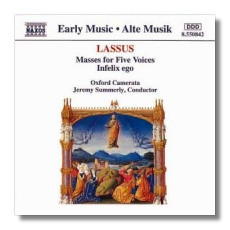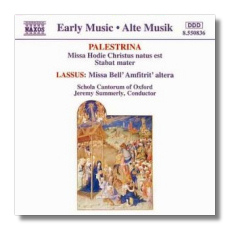
The Internet's Premier Classical Music Source
Related Links
- Lassus Reviews
- Latest Reviews
- More Reviews
-
By Composer
-
Collections
DVD & Blu-ray
Books
Concert Reviews
Articles/Interviews
Software
Audio
Search Amazon
Recommended Links
Site News
 CD Review
CD Review
Orlandus Lassus

Masses
- Missa Entre vous filles
- Missa Susanne un jour
- Motet "Infelix ego"
Oxford Camerata/Jeremy Summerly
Naxos 8.550842 DDD 68:24


- Missa Bell' Amfitrit' altera
- Giovanni Palestrina:
- Missa Hodie Christus natus est
- Motet "Hodie Christus natus est"
- Stabat Mater
Schola Cantorum of Oxford/Jeremy Summerly
Naxos 8.550836 DDD 65:49
The appearance of Renaissance polyphony on a budget label like Naxos must be one of the best things to happen to this kind of music in the four hundred years since it was written – it's bound to take it to an audience many times bigger than ever before. And in performances as generally reliable as these by Jeremy Summerley and his two Oxford groups (the Camerata twelve-strong and the Schola Cantorum almost three times bigger) those new listeners will find a reliable guide, even Summerley's sound isn't quite the last word.
The first of these Naxos releases offers an eminently sensible coupling music by Palestrina and Lassus, the two towering giants of their day (both died in 1594), since it underlines the striking differences between them. Here we have some of their best-known music: two eight-part parody masses ('parody' because based on existing music – there is no humorous intent), Palestrina's Missa Hodie Christus natus est and the buoyant Christmas motet which underlies it and Lassus' Missa Bell' Amfitrit' altera (presumably taking an as yet undiscovered madrigal as its starting point), with a bonus in the form of Palestrina's Stabat Mater, a compact and conciliatory little masterpiece. The divergences in style suggest two very different men. Palestrina's music is authoritative and assured: it rolls forwards in long, purposeful lines that make a seamless whole, the music of faith, of certainty – at its most obvious in the grandiose statement in the Credo at the phrase "Et unam sanctam catholicam et apostolicam Ecclesiam". There is no doubt in this man's mind. Lassus' vocal lines, by contrast, are shorter, more nervous; phrases are apt to be repeated, giving the music a feeling of kaleidoscopic colour. Palestrina's harmonies are strong, confident, solid; Lassus' are richer, warmer – more human.
That essential humanity, the warmth and sheer lovability of Lassus' music can be found again in the second of Jeremy Summerley's new Naxos discs, in the two five-part parody masses Entre vous Filles and Susanne un jour, separated here by the sombre, intense motet Infelix ego. Lassus' tendency to repeat lines, coupled with the dancing lilt that so often illuminates his textures, frequently gives a touching, folk-like innocence to the music – listen to how he plays with the words 'Hosannah in excelsis' in the Sanctus of the Missa Entre vous Filles. I found myself regularly beaming with enchanted delight as I listened to this disc.
With both these groups (which, to my surprise, have only one soprano in common) Summerley obtains performances come close to doing the music full justice. My caveats are that here and there he could find more characterisation in the music, particularly in the Lassus works. A more sharply focussed sound would have helped – neither group has the pungent, tight sound of, say, Harry Christopher's The Sixteen nor the smooth, polished tone of Peter Phillips' Tallis Scholars. And presenting polyphony without its framework of plainchant robs the music of music of its music, as AS&V's estimable recent series of Ludford festal masses makes clear. Still, on this label and at this price, that purist complaint is perhaps out of place, and one can only hope that Summerly will be coming back to both composers regularly.
Above all, back to Lassus. Where Palestrina commands the deepest respect, Lassus earns no less than love. And though Palestrina is already acknowledged as one of the great masters, a general agreement that Lassus was one of the finest composers ever known has yet to be established. For that to happen his vast output has to be better known, and its appearance on this kind of budget label must be applauded. If you are one of the decreasing band of listeners who have not yet sampled the heart-warming sound of Renaissance polyphony, you really ought to risk a fiver on one of these discs. It will change your life.
Copyright © 1994 & 1998, Martin Anderson.
This review originally appeared in CD Review


















